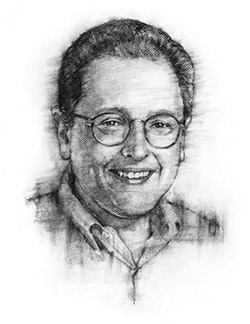Talking Points
Illustration by Allan Burch

Name: Brian Leiter
Title: Since July 1, codirector, Center for Law, Philosophy, and Human Values; and John P. Wilson professor of law
Degrees: AB (philosophy), Princeton; JD, PhD (law, philosophy), University of Michigan
Previous posts: At the University of Texas at Austin, he directed the Law & Philosophy program (1995–2008). In 2002 he became the youngest faculty member at the UT law school to hold an endowed chair. Visiting professorships include Chicago (fall 2006) and Yale (1998–99).
Latest book: Coedited with Michael Rosen, The Oxford Handbook of Continental Philosophy (Oxford University Press USA, 2008)
Number of blogs: Six—topics range from law and philosophy graduate-program rankings to Nietzschean scholarship
Academic blogging: The two blogs I update most often are on the philosophy profession and the legal academy. These are mostly devoted to professional news of interest to the community of scholars, teachers, and students. The Internet is a remarkably efficient way to circulate this kind of information, and now that the blogs are well known, colleagues elsewhere regularly volunteer information.
I’ve tried the experiment more recently of using blogs to do more substantive, scholarly work, one via my “legal philosophy” blog and one via a blog on Nietzsche, the moral philosopher on whom I’ve done the most work. I update these infrequently, but usually I use them to try out ideas or bits and pieces of writing that are in draft to get feedback. It’s worked reasonably well, especially on the Nietzsche blog, where readers often identify bits of text that I’d neglected.
Ranking philosophy programs: I started ranking philosophy graduate programs in 1989, while in graduate school. It was very informal, just for undergraduates at Michigan and a few friends elsewhere. My motivation then was the same as now—to give students who are thinking about investing six to ten years of their life in PhD study current and reliable information about program quality, which, in philosophy, really means the quality of the faculty. My informal philosophy rankings became quite popular, but their influence exploded after NYU put them on the Internet in 1996. Shortly thereafter, Blackwell Publishers bought the right to host them on the Internet at philosophicalgourmet.com.
We now survey hundreds of philosophers around the world, asking them to evaluate several dozen PhD programs in the United States, Britain, Canada, Australia, and New Zealand, both overall and in more than two-dozen specialties. To maintain objectivity, I rely on an international advisory board of 60 philosophers to nominate experts in their fields as evaluators.
A U.S. News challenge: Law school rankings are a different matter, since law schools are already cursed with a well-known ranking by U.S. News & World Report. When I entered law teaching in 1993, everyone I met, everywhere I went, complained about how bad the U.S. News rankings were. Since what law professors hate about U.S. News is that almost none of the criteria have anything to do with the educational, scholarly, or professional mission of a law school, I decided to start collecting data along these parameters.
The law-school rankings are based on publicly available data. I try to make the assessment method as transparent as possible, so anyone can duplicate the results or at least understand what factors influence the results.
Why he came to Chicago: The Law School is by all meaningful measures one of the best in the country. Texas has a better philosophy department overall, but not in most areas of interest to me. Chicago has an outstanding group of faculty working in Kant and post-Kantian German philosophy. Jonathan Lear wrote a splendid volume on Freud in the Routledge Philosophers series I edit, and Michael Forster and I are organizing a reading group this year for PhD students on Nietzsche.
[Center for Law, Philosophy, and Human Values codirector] Martha Nussbaum is one of the world’s most influential political philosophers. I bring, I hope, complementary expertise in other areas of law and philosophy, including the jurisprudence of American legal realism [the idea that because law is made by humans, it is imperfect].
Central philosophy: The Law School has been the dominant presence in law and economics for decades. By establishing the Center for Law, Philosophy, and Human Values, Dean [Saul] Levmore is signaling a commitment to establishing a similar degree of eminence in law and philosophy. We will host speakers and conferences that enrich the curriculum and extracurricular intellectual life. Nussbaum and I hope the center will be a focal point for interdisciplinary work across units such as philosophy, political science, and psychology.
Law and philosophy is philosophical inquiry into the nature of law itself. Human societies are suffused with norms—of behavior, ethics, etiquette, religion, and the law. What exactly distinguishes legal norms from all the others? Why should we obey them and take them seriously? And what role do these norms really play in how courts decide cases?
Return to top